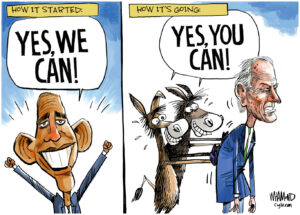Lessons From the Oil Spill
Flying back to Washington from Pensacola, Fla., on June 15, President Obama and the man he put in charge of handling the Gulf oil spill, retired Coast Guard Adm. Thad Allen, had a come-to-Jesus talk.Flying back to Washington from Pensacola, Fla., on June 15, President Obama and the man he put in charge of handling the Gulf oil spill, retired Coast Guard Adm. Thad Allen, had a come-to-Jesus talk. The administration was getting hammered for a slow and disorganized response to the environmental disaster, and the president wanted to know, then and there, what resources Allen needed to get the job done. Obama made clear, in Allen’s words, that “there would be no do-overs.”
That conversation aboard Air Force One marked what Allen, in a recent interview, called the “pivotal point” in the effort to contain the biggest spill in U.S. history. Allen said he told Obama that his most urgent problem wasn’t with anything that was taking place underwater or along the Gulf shore, but in the sky.
Helicopters and fixed-wing aircraft were buzzing above the oil spill in an uncoordinated swarm, accomplishing little of value and barely managing not to crash into one another — there had already been eight near-miss incidents. What he desperately needed, Allen told the president, was military control of the air space. Obama gave the order to make it so.
“We needed to manage the situation as a three-dimensional battle space,” Allen recalls. “I got up at 4 the next morning and wrote an e-mail explaining to everyone that we were going to move away from a traditional spill response and go to 3-D battle management.”
Allen said this change made all the difference. With a command center at Tyndall Air Force Base near Pensacola coordinating all air traffic in the area, Allen could stop worrying so much about possible accidents and deploy his ad hoc fleet of military and civilian aircraft more effectively to find the widely dispersed sheets and ribbons of oil.
With vastly improved observation from above, Allen said, it was possible to better deploy the thousands of ships that were plying the waters of the Gulf, looking for oil to burn, skim or contain with floating booms. These included the many “vessels of opportunity” — shrimp boats, pleasure craft and the like — that were not well equipped to find the patches of oil on their own. “As the oil gets closer to shore, it’s harder to find,” Allen said. “You had to be able to tell a ship, ‘You’re almost there, but just go one mile to the west.'”
The administration announced with fanfare last week that of the estimated 4.9 million barrels of oil that gushed out of the Deepwater Horizon well, three-fourths of the total had been captured, skimmed, burned, dispersed — or had simply evaporated — before it could despoil the coast. Some experts have called this assessment overly optimistic, and serious questions remain about the possible long-term environmental effects of the oil that remains in the Gulf.
There are also questions about the ultimate impact of the chemical dispersants that BP applied in unprecedented quantities. Allen acknowledges that how much oil remains in the Gulf, and what effect the oil and dispersants are having on marine life, will not really be known until scientists have the chance to conduct further studies.
Also yet to be known is how the improvised technology that was ultimately used to cap the gusher will change the way the oil industry operates in the Gulf. Before the blowout, Allen said, there was no protocol for handling such an event. By cobbling together some techniques and equipment used in the North Sea and others used in the Atlantic off the coast of Angola, engineers found ways to capture some of the oil, creating, in effect, “an oil production system that did not exist in the Gulf of Mexico.”
Allen, 61, was commandant of the Coast Guard when Obama put him in charge of handling the oil spill, but he retired his commission several weeks later. He has agreed to stay on the job until it is certain that the crisis is over. Asked if he knew when the president would release him, Allen said, “I’ve asked for a parole hearing. But I know that my departure has to be conditions-based.”
Much of his focus now is on containing and cleaning up the oil that remains — and on doing his best to ensure that the knowledge gained from dealing with the Deepwater Horizon spill is put to good use.
“It would be adding a crime to a crime,” he said, “if we didn’t make this one of the great learning laboratories in the history of this country.”
Eugene Robinson’s e-mail address is eugenerobinson(at)washpost.com.
© 2010, Washington Post Writers Group
Your support matters…Independent journalism is under threat and overshadowed by heavily funded mainstream media.
You can help level the playing field. Become a member.
Your tax-deductible contribution keeps us digging beneath the headlines to give you thought-provoking, investigative reporting and analysis that unearths what's really happening- without compromise.
Give today to support our courageous, independent journalists.








You need to be a supporter to comment.
There are currently no responses to this article.
Be the first to respond.